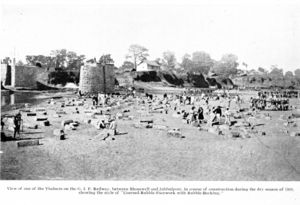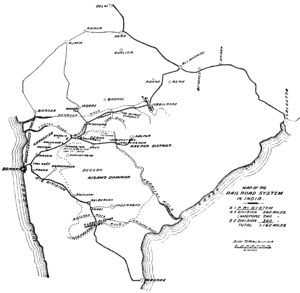Alfred Viaduct: Difference between revisions
Work in progress draft |
Citation for image changed to Ted Pope as requested |
||
| (One intermediate revision by the same user not shown) | |||
| Line 1: | Line 1: | ||
The '''Alfred Viaduct''' carried the [[Great Indian Peninsula Railway]](GIPR) mainline from [[Bombay]] to meet the [[East Indian Railway]](EIR) at [[Jubbulpore]], hence connecting [[Bombay]] to [[Calcutta]] when the line opened in 1870. | The '''Alfred Viaduct''' carried the [[Great Indian Peninsula Railway]](GIPR) mainline from [[Bombay]] to meet the [[East Indian Railway]](EIR) at [[Jubbulpore]], hence connecting [[Bombay]] to [[Calcutta]] when the line opened in 1870. | ||
[[File:Alfred Viaduct Construcion - R M Brereton's workforce.jpg|right|thumb|R M Brereton' | [[File:Alfred Viaduct Construcion - R M Brereton's workforce.jpg|right|thumb|The piers under construction with R M Brereton marked with an 'X'<ref name=Brereton>[https://archive.org/details/reminiscencesofo00brer "Reminiscences of an old English civil engineer, 1858-1908" by Robert Maitland Brereton]; page 10. The image used is by courtesey of Ted Pope and is from his great grandfather's book.</ref>]]. | ||
The viaduct is a single line girder bridge supported by 6 massive pillars and single line railway over the Tawa River near Bagra Tawa Station on the [[Bhusawal]] to [[Jubbulpore]] section of the GIPR. In some records it is named the '''Bagratawa railway bridge''' and also the '''Towa Viaduct'''. | |||
All the heavy material from England had to come by rail from Bombay <ref name=states>[http://www.thestatesman.com/mobi/news/8th-day/the-opening-of-the-mumbai-to-kolkata-railway/141013.html#SL3vjC1hEy3Vmu3P.99 The Statesman, New Delhi "The opening of the Mumbai to Kolkata railway by Michael Sandford, May 9 2016]; Retrieved 29 Jun 2016</ref>. | All the heavy material from England had to come by rail from Bombay <ref name=states>[http://www.thestatesman.com/mobi/news/8th-day/the-opening-of-the-mumbai-to-kolkata-railway/141013.html#SL3vjC1hEy3Vmu3P.99 The Statesman, New Delhi "The opening of the Mumbai to Kolkata railway by Michael Sandford, May 9 2016]; Retrieved 29 Jun 2016</ref>. | ||
Latest revision as of 04:58, 2 July 2016
The Alfred Viaduct carried the Great Indian Peninsula Railway(GIPR) mainline from Bombay to meet the East Indian Railway(EIR) at Jubbulpore, hence connecting Bombay to Calcutta when the line opened in 1870.

.
The viaduct is a single line girder bridge supported by 6 massive pillars and single line railway over the Tawa River near Bagra Tawa Station on the Bhusawal to Jubbulpore section of the GIPR. In some records it is named the Bagratawa railway bridge and also the Towa Viaduct.
All the heavy material from England had to come by rail from Bombay [2].
In July 1868 Robert Maitland Brereton, the GIPR Chief Engineer was given responsibility for completing the connection between Bhusawal and Jubbulpore which he completed many months ahead of schedule [2].

On 8 Mar 1870 the bridge was inaugurated and named the 'Albert Viaduct' after the Duke of Edinburgh (Alfred Ernest Albert) who was visiting India and travelled by East Indian Railway from Calcutta. The Viceroy and the Governor of Bombay, Sir Fitzgerald Seymour had come from Bombay [2].
Over the years the structure has stood the test of time and various maintenance activities like grouting the piers etc. has helped in maintaining this structure for so long. It does have the provision for double line operation but still this section is single line probably because of an tunnel ahead [3].
References
- ↑ "Reminiscences of an old English civil engineer, 1858-1908" by Robert Maitland Brereton; page 10. The image used is by courtesey of Ted Pope and is from his great grandfather's book.
- ↑ 2.0 2.1 2.2 The Statesman, New Delhi "The opening of the Mumbai to Kolkata railway by Michael Sandford, May 9 2016; Retrieved 29 Jun 2016
- ↑ Drag Times “Bagratawa railway bridge /Alfred Viaduct” which includes a good U-Tube video of the bridge today; Retrieved 29 Jun 2016